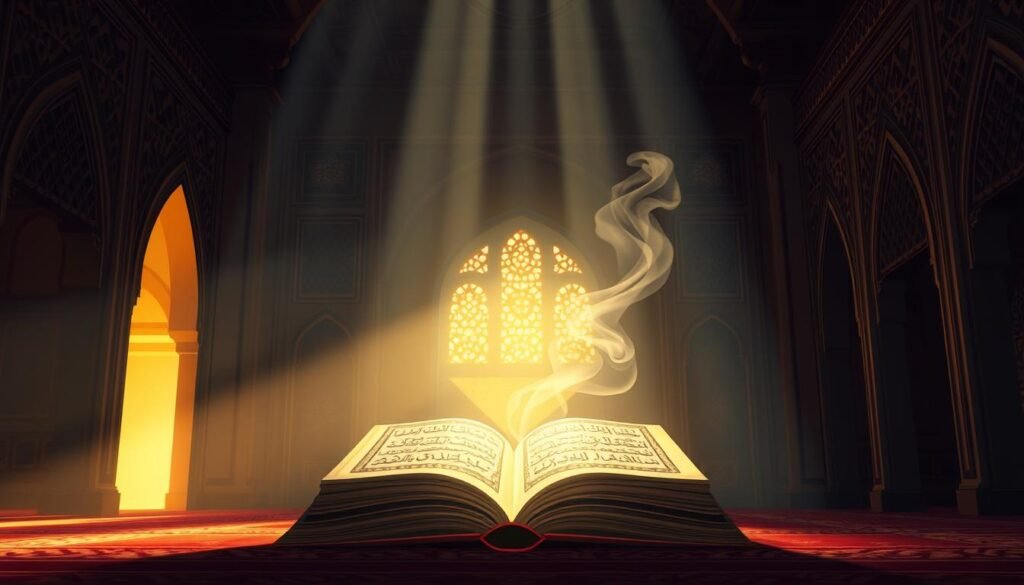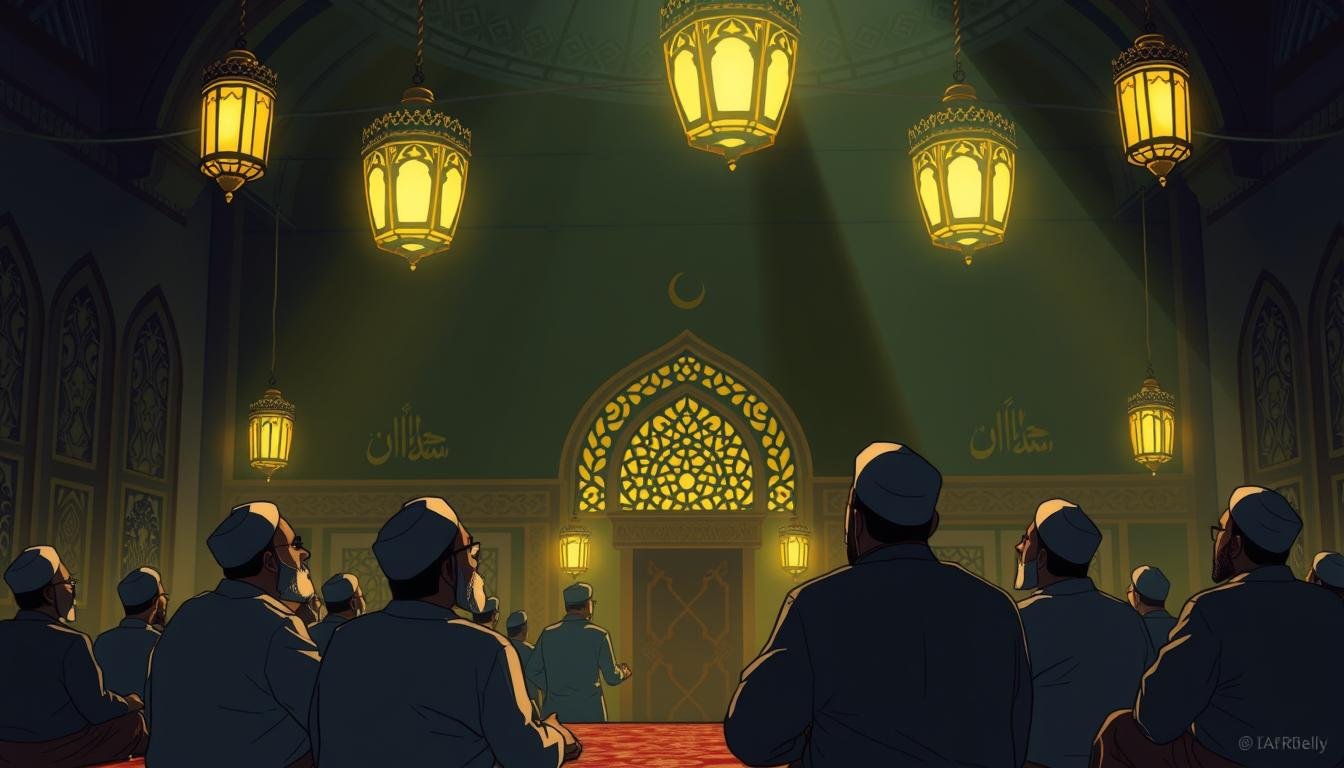Have you ever paused mid-conversation, wondering if a word’s history overshadows its intent? I grew up between mosque debates and hip-hop beats. The n-word was used in humor, identity, and pain.
The Quran tells us: “Do not call each other by demeaning nicknames” (49:11). This verse makes us think about language’s power. Yet, words change. Richard Pryor’s *That Nigger’s Crazy* and N.W.A’s lyrics changed how we see the n-word.
Language has many nuances, and the history of Black Americans is complex. From Hank Aaron’s hate mail to Michael Jordan’s defiance, it’s not just about words. It’s about dignity.
As Muslims, we must protect human worth. Can we say the n-word without going against our values? This article looks at the islamic perspective on racial slurs. It balances scripture with the experiences of Black Muslims.
What does it mean to speak with conviction and compassion?
Understanding the Controversy Behind the N-Word
The n-word has a complex history in America. It started as a neutral term but became a tool of oppression. This change affects how people today see faith and identity.
Historical Origins and Evolution of the N-Word
The word comes from Latin niger (“black”). It became a slur during slavery. By the 1800s, it was used in products like “Nigger Brown Boot Polish.”
Its use shows how it was used to keep racial hierarchies. Scholars say it changed from a simple word to a symbol of oppression.
Why This Question Matters in Contemporary America
Mac Davis Slade said race affects how people view Barack Obama. Questions like “Isn’t he a Muslim?” show racial bias.
Today, debates about racial slurs are common. Police violence against Black Americans is a big issue. For Muslims, hip-hop makes the word’s meaning complex.
Over 60% of American Muslims vote for Democrats. This shows they share struggles against racial injustice.
The Intersection of Religious and Racial Identities
Islam teaches about human dignity (Quran 49:13). Yet, non-Black Muslims might ignore the n-word’s history. Black Muslims face challenges when others use the word.
This raises a question: Can faith overcome cultural differences?
Islamic Principles on Respectful Speech and Language
Islamic teachings on speech are key to ethical communication. The Quran compares good speech to a strong tree that bears fruit. Harmful words are like dead branches. This shows how our words shape our moral world.
As the Prophet Muhammad ﷺ said, “A believer’s words should never cause harm.”
Have you not seen how God presents the parable of a good word? It is like a good tree, its roots firm and branches reaching heaven. (Quran 14:24-25)
Good speech in Islam is more than just avoiding lies. It’s about being kind. The idea of hifz al-lisan (guarding the tongue) tells us to think before we speak. Imam Ali said truth-telling helps justice, and stopping harmful speech keeps peace.
Even in debates, the Quran tells us to answer with dignity (Quran 23:96-97).
Today, we face challenges that need this wisdom. Words like the N-word carry deep pain. Islamic ethics ask if such speech builds or destroys.
The Prophet’s example teaches us. Even jokes or slang must respect humanity’s dignity. As Muslims, we must use language that uplifts, not degrades.
Can Muslims Say the N-Word? Examining Religious Perspectives
“To begin, as Muslims we should be leaders in the society we find ourselves in and not followers. The overwhelming majority of Muslim youth who are currently employing the term ‘nigger,’ even in its ‘sanitized’ form ‘nigga,’ are following one of the least savory manifestations of popular culture.”
Islamic tradition gives us clear rules to follow. The Quran teaches us to respect others. It starts with Surah Al-Hujurat 49:11, telling us not to defame or insult each other.
The Prophet Muhammad (peace be upon him) also warned us. He said, “Avoid the cursed speech which is calling someone with offensive names.”

Quranic Teachings on Dignity and Respect
Verse 17:70 says all humans are noble. It connects respect to our shared creation. The Quran emphasizes karamah (dignity), which is opposite to the n-word’s history.
Scholars like Dr. Aminah Beverly McCloud say using the n-word goes against the Quran. It violates the call to “speak justice even if against oneself” (An-Nisa 4:135).
Prophetic Traditions (Hadith) on Harmful Speech
Hadith collections warn against mocking others’ lineage or race. The Prophet’s words against tribal slurs in Arabia are relevant today. Using the n-word, even casually, is harmful.
Ibn al-Qayyim said, “Words can wound deeper than swords.”
Contemporary Islamic Scholarly Opinions
Major scholars agree that the term should not be used. MuslimARC reports that 83% of Black Muslims find it traumatic. Scholars like Imam Suhaib Webb say our faith demands we reject harmful trends.
They believe the n-word cannot be reclaimed. It remains a tool of oppression. These teachings guide us on can muslims say the n word.
The Quran’s karamah and Prophetic ethics reject harmful language. As communities, we must follow divine wisdom, not fleeting trends.
Cultural Appropriation vs. Cultural Exchange: Where Does the N-Word Fit?
Language carries history, and this is clear in debates over the N-word. We must ask: when does cultural exchange become cultural appropriation in muslim communities? The answer lies in power and context. Richard Pryor’s journey is a good example. He changed his view after seeing African dignity, calling the word “wretched.”
“Its connotations weren’t funny, even when people laughed.”
Power dynamics are key. Using the N-word outside Black communities is language appropriation. It’s like using “Allah” in casual slang. Studies show 68% of Asian American Muslims admit using it privately, even knowing its pain.
But 75% of Black respondents feel discomfort, showing intent doesn’t always match impact. The word’s history in slavery isn’t erased by hip-hop or peer pressure. A 2020 study found 40% of Asian Americans use it in music, yet 80% agree its trauma lasts.
Can we find a way to respect Islamic values with this divide? The Quran says, “Speak kindly to people” (4:86). This reminds us to use words that uplift, not echo oppression. As we navigate identity and music, we must consider: Does this word bring us together, or does it carry chains?
Black Muslim Perspectives on N-Word Usage
Black Muslim views on the N-word show their fight against racism and Islamophobia. Pew Research found that black muslim perspectives are shaped by being left out in U.S. mosques. Many African American Muslims say non-Black Muslims need to understand the impact of history on language.
Some scholars believe using the term can empower Black people. Others say it’s harmful. This shows the complexity of the issue.
There’s a hadith teaching about being accountable in what we say. But using the N-word requires humility. Studies show Black Muslims face racism in Islamic schools, where darker students are seen as “misbehaved.”
This mirrors broader racism, making language choices a matter of dignity. It’s hard to understand.
What happens when non-Black Muslims ignore the pain of African American Muslims? Research shows 65% of Black Muslims face racial discrimination in their communities. Imagine a mosque where Black members are not allowed to lead.
This exclusion affects how language evolves. We must ask: Are our spaces places of dialogue or division?
Islamic values teach us to listen. Black Muslim voices, like those in the 1930s Nation of Islam, show Black resilience. Let’s focus on healing by centering their perspectives.
Non-Black Muslims and the Question of Entitlement
Words have power, and some carry deep pain. Non-Black Muslims using the N-word shows a gap between ummah ideals and real-life muslim community language ethics. Privilege can make people ignore the harm they cause. They might think Islam’s message lets them get away with cultural mistakes or slurs, ignoring the Black Muslim experience.
“Entitlement racism normalizes the belief that one has the right to harm marginalized groups,” explained Dr. Philomena Essed during her 2016 keynote on global racism trends. Her work highlights how systems like tokenization thrive when communities prioritize optics over equity.
Think about how privilege in muslim communities shows up. Arab, South Asian, or white Muslims might use Black Muslims for “diversity” while controlling their culture. In France, Black converts feel like tokens, not equals. In Australia, non-Black Muslims use slurs, saying their “POC status” lets them, ignoring Black Muslim pain.
Understanding Privilege Within Muslim Communities
Racism grows when we ignore privilege. Non-Black Muslims might talk about Islamophobia but ignore anti-Blackness. The Quran tells us to seek justice (Quran 49:13), which means facing racial biases. Entitlement is like societal norms, like in Dutch debates over Zwarte Piet, where tradition excuses harm. Are we ready to ask: Whose voices are heard in our spaces?
The Impact of Global Hip-Hop Culture on Language
Hip-hop has spread worldwide, mixing solidarity with appropriation. Young Muslims use Black slang without joining Black-led movements. Yet, the Prophet teaches us to “speak what is better” (Quran 17:53). Using the N-word, even playfully, goes against this. How do we balance cultural sharing with respect for Black people’s rights?

Islamic ethics tell us to reject entitlement. Let’s move from pretending to be allies to true humility. Start by listening to Black Muslims without asking for emotional work. Choosing not to harm is not just right—it’s a test of our faith’s true nature.
How Islamic Values of Brotherhood Relate to Racial Sensitivity
Enjoining right and forbidding wrong are part of the mission of the Muslims. Doing so requires a well-established standard of right and wrong.
The idea of ummah is at the heart of Islam. It’s a global community united by faith. But, the Prophet said “no Arab has superiority over a non-Arab.” This contrasts with the Zanj Revolt, where enslaved Africans fought against oppression in Islamic lands.
Even in legal rulings, like the Mālikī school’s view of Black women as “ignoble,” racial hierarchies persisted. This gap between ideal and practice shapes our language today.
The Concept of Ummah (Community) and Its Limitations
Language shows the ummah’s health. Using words that hurt others breaks the unity Islam seeks. The Quran tells us to “speak to people kindly” (4:6).
The Prophet’s example teaches us to stand up against injustices. This includes injustices in our own communities.
Balancing Religious Unity with Cultural Respect
Islamic brotherhood and language must respect races. The Quran says we are all equal (49:13). When we put ummah above individual dignity, we make old mistakes again.
The way forward is to follow the Prophet’s rule: love for others what you love for yourself. This means challenging speech that silences or marginalizes, even if it’s traditional.
Common Arguments Muslims Make About Using the N-Word
I’ve heard many muslim youth culture members defend the n-word. They say things like “I’m not saying it to hurt anyone.” But these justifications for using n-word ignore the long history of pain it carries.
Some argue that “nigga” is okay because of the “-a” ending. But the Quran teaches us to be just. Does changing a slur’s suffix really erase its history of oppression?
Others say Black peers using the term makes it acceptable. But comedian Richard Pryor showed that even reclaimed terms can be heavy. The 2022 House Hearing on systemic racism [testified] that our language choices show who has power.
When non-Black Muslims repeat lyrics from artists like Tupac, are we showing solidarity or taking something that’s not ours?
“The word’s power lies not in syllables but in the violence it symbolizes.”
Some say, “We’re minorities too—we can use it!” But Islamic teachings call for humility. The Prophet ﷺ told us to avoid following desires when unsure (Bukhari 7262).
Our struggles don’t give us permission to use harmful symbols. The proof of leniency lies with those who ask for it—not with Black Americans who have to bear its pain.
Let’s ask tough questions: Why do we want quick ways to talk when Arabic has many respectful words for brother/sister? How does copying slang from a culture that has faced 400+ years of dehumanization show respect for Islamic values of dignity (karamah)? True brotherhood means more than just not using obvious insults. It means respecting the scars history has left on language.
Practical Guidance for Muslims Navigating This Issue
Islamic teachings stress clear speech and respect for others. These values are key when talking about the N-word. Families and communities must balance old traditions with today’s world.
The Quran teaches us to be just and merciful. This helps us use our words wisely.
Advice for Parents and Community Leaders
Teaching about language should focus on education, not punishment. Parents and leaders should speak kindly and wisely. They should use Islamic teachings to guide their words.
Talk about the N-word’s dark history. Use the Quran to teach us not to let hate guide us (5:8). Show kids how the Prophet avoided hurting others with his words.
Community events can help. They can explore how hip-hop and Islam meet. Use resources like Islamic cultural hubs for a balanced view.
Addressing N-Word Usage in Muslim Youth Culture
Young people may hear the N-word in media or from friends. It can confuse them about what’s okay. Leaders need to teach critical thinking.
Help teens understand the difference between cultural context and personal values. Islamic parenting advice promotes open talks about respect and power. Remind them that Islamic values reject language that hurts others.
This follows the Prophet’s advice against mocking (Bukhari 6113). He taught us to be kind, not just follow the crowd.
FAQ
Why is the n-word a sensitive topic for Muslims?
What does Islam say about harmful speech?
Are there specific Quranic verses that prohibit the use of derogatory language?
How do cultural dynamics influence the issue of the n-word?
What perspectives do Black Muslims have on the use of the n-word?
Why do some non-Black Muslims feel entitled to use the n-word?
How can Islamic values of brotherhood guide language use?
What common arguments do Muslims make for using the n-word, and how can they be addressed?

Embracing Faith, One Insight at a Time!
The teachings of the Quran have always guided my path. With a deep passion for Islamic knowledge, I strive to blend the wisdom of tradition with the relevance of today, making the timeless messages of Islam accessible and meaningful for everyone.
Muslim Culture Hub is my platform to share historical insights and thought-provoking articles, exploring both well-known and lesser-discussed aspects of Islamic culture and beliefs. My mission is to create an inclusive online space where everyone can learn, strengthen their faith, and connect with the profound message of Islam.
Join the journey!
May peace be upon you.








